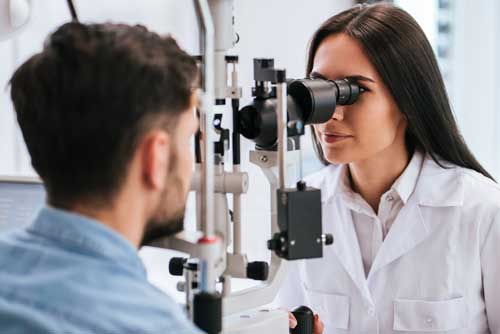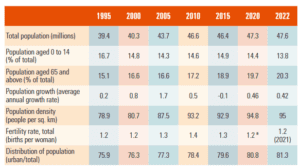The Best Vision Insurance In California: 4 Things to Look For

This blog was updated in May of 2022
ALONG WITH HEALTH INSURANCE, MOST CALIFORNIANS USUALLY PURCHASE DENTAL AND VISION INSURANCE. THESE PLANS ARE OFTEN INCLUDED WITH THEIR EMPLOYER-PROVIDED HEALTH INSURANCE COVERAGE. OTHER TIMES, HOWEVER, INDIVIDUALS MAY FIND THAT THEY NEED TO PURCHASE THEIR OWN VISION INSURANCE IN CALIFORNIA.
While not everyone needs glasses, maintaining vision and eye health are still essential functions. And, if you already wear glasses, you can appreciate the value of quality vision insurance. However, many individuals forego coverage either from a lack of need or an understanding of the cost savings that vision insurance can provide.
As one eyewear provider notes, in the U.S., the cost of eyeglasses ranges from as low as $50 to over $1,000 for a single pair, and the average cost is $196 for a typical pair of eyeglasses.
While that may seem somewhat insignificant in and of itself, the cumulative costs of office visits, eye exams, prescriptions and other vision health-related expenses can add up substantially.
THE IMPORTANCE OF VISION INSURANCE IN CALIFORNIA
Who needs vision insurance in California?
The simple answer is anyone who has vision health requirements. This could be corrective lenses in the form of prescription eyeglasses or contacts, treatment for common conditions such as stigmatism or glaucoma, or even laser surgery to correct vision issues.
While it is true that not everyone needs vision health services, unlike medical or dental care, a surprisingly sizable proportion of people do.
According to the National Institutes of Health,
“The prevalence of presbyopia has been estimated at nearly 80% by age 45–55 in North America 3,4 with an estimated 16% of these individuals without adequate correction.”
Presbyopia is the medical term for what many refer to as “failing sight” or old eyes.
Harvard Health Online describes it this way,
“As we age, the lens of the eye becomes increasingly inflexible, making it harder to focus clearly on near objects. This is called presbyopia. No one knows exactly what causes the lens to become inflexible, but it happens to everyone as a natural part of aging.”
And, according to the Vision Council of America, approximately 75 percent of adults use some sort of vision correction. Most of us, about 64 percent, wear eyeglasses, while the other 11 percent choose to wear contact lenses. In addition, optometrists recommend that prescription eyewear be replaced every one to three years.
Interestingly, as well, over half of all women and just 42 percent of men wear glasses.
EYE HEALTH IS CRITICAL AND VISION INSURANCE CAN HELP MAINTAIN IT

The Center for Disease Control and Prevention (CDC) sited a survey that found the biggest health fear for many Americans is blindness. In fact, most people are so fearful of losing their vision that many would rather lose their memory, their speech, even a limb!
And the truth is that, even in advanced societies with the healthiest populations, eye disease and conditions occur.
For example, several serious eye conditions that present no early warning signs or symptoms include glaucoma, diabetic eye disease, and age-related macular degeneration. And these conditions can only be detected through a comprehensive eye exam.
A common but largely overlooked benefit of regular eye exams is that can help detect health conditions such as diabetes, high cholesterol, and even high blood pressure.
The bottom line then is that vision insurance can help pay for your regular eye exams, which can be instrumental in detecting a variety of potential vision and health problems, as well as covering much of the costs of treatment and prescription eyewear.
CHOOSING VISION INSURANCE IN CALIFORNIA
Vision insurance is used primarily for reducing the costs of eyeglasses, contacts, and eye exams. Some plans will even help cover part of the costs of LASIK surgery. Vision plan details, much like health insurance, varies with some plans covering the full cost of eye exams, while others require a copay, for example.
Vision insurance plans commonly include coverage for annual exams, eyeglass frames and lenses, as well as contacts. Many plans have price limits for frames and contacts, while some may cover certain brands. Vision insurance coverage providers often have higher-tier plans that also include coverage for contact fitting appointment, lens protection, and even LASIK surgery.
Choosing vision insurance in California can make a substantial difference in the overall cost of your vision care, but that is dependent on the details of the plan. It’s not uncommon for two different plans with similar premium costs to offer significantly different benefits.
Making the right vision insurance plan choice depends largely on the specific services you need today – and expect to have in the future.
While there are many factors to consider with vision insurance, there are a few major considerations that we review here.
1. COMPETITIVE PREMIUMS
Paying as little as possible is certainly an understandable goal, but when it comes to products such as vision insurance, low costs can mean minimal benefits.
And, while paying too much is certainly possible, the best vision insurance providers work to keep both their premiums competitive, and their plan benefits attractive. Low-end plans, for example, often provide minimal benefits such as coverage for new glasses only once every 2 years or only covering the costs of eye exams. And some plans are simply discounts on glasses and provide no allowances.
2. EYEWEAR FRAME ALLOWANCE
Recommended vision insurance plans, such as with VSP, provide substantial frame allowances. These will vary s depending on the plan and carrier, but they usually range between $100 and $250, with $150 to $175 being the most common.
If you wear glasses all day and are under, say, 30 years old then a plan that offers a larger allowance for eyeglass frames might be preferable to a lower-cost plan that has more limited frame allowances.
3. AFFORDABLE COPAY LENS OPTIONS
According to one article,
“The amount of eye-related expenses a vision insurance plan will cover differs significantly from plan to plan. One plan might charge you a $10 copayment for an eye exam and cover the difference. Another plan might pay for $35 of your exam and expect you to pay the rest.”
VSP Vision, for example, offers several plans including their Standard and EasyOptions plans.
For their Standard plan monthly premiums start at about $13, depending on where you live, with an eye exam copay of $15 and covers up to $150 for new frames.
Their EasyOptions plan costs a bit more at around $24 per month. Although this plan has all the same benefits the Standard option it also allows members to customize their benefits package by allocating more money toward the products they use more often.
4. CONVENIENT NETWORK
Similar to health insurance coverage, many vision plans are part of preferred provider organization (PPO) networks. This means that you can usually choose to use a vision care provider that is not part of the network, although the coverage amounts are often lower for out-of-network providers.
When it comes to the breadth of coverage, it is also important to choose a plan that has vision care providers available near where you live. This is especially true for plans that are not in a PPO.
J.C. LEWIS INSURANCE AND VSP – A GREAT OFFERING
While we understand that there are certainly options available, at J.C. Lewis Insurance, we believe that the best vision insurance option we can offer our clients is Vision Care Plan, or VSP.
With four different policy types available and having coverage in 47 states, choosing your California vision plan coverage with VSP Vision Care also means you can choose to use a care provider either the VSP network of providers or choose a provider outside of the VSP network.
VSP is considered by many to be the premier vision insurance company in the nation as well as in California.
One reviewer, for example, pointed to several perks they ranked as significant including:
Being the largest vision insurer in the US
Monthly premiums start at $13
No waiting period
A helpful online plan wizard
In addition, they noted that,
“VSP is our top pick because it offers multiple plans with flexible coverage and costs, and because it is the largest provider of vision insurance available to most people.”

OFFERING THE BEST VISION INSURANCE PLANS IN CALIFORNIA
J.C. Lewis Insurance wants to be your vision insurance partner and we can also help you with quality health insurance plans only from the leading health insurance carriers licensed to do business in California.
We are a family-owned and operated health insurance agency located in Santa Rosa, California and have been for over four decades.
Specializing in finding and managing vision insurance plans, along with medical and dental coverage for both individuals and families, as well as small businesses, we are licensed and certified by each insurance carrier we represent.
In addition, we help seniors obtain the best coverage for Medicare supplemental and prescription drug plans.
At J.C. Lewis Insurance we understand that when considering different vision, dental and health insurance plans, you are likely to have questions and concerns. And we encourage you to bring your questions about health coverage insurance to us and you can be assured that JC Lewis Insurance Services will help you find the right solutions for your health insurance needs, as well as vision coverage.
So, call us today for more information or request a quote online.

The post The Best Vision Insurance In California: 4 Things to Look For appeared first on JC Lewis Insurance.



